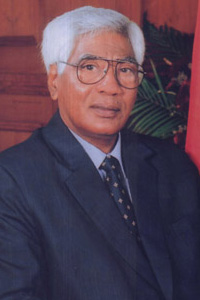 |
|
||
|
|||
Balfour African President-in-Residence
Former Mauritius leader: his nation an example of economic opportunity in Africa
By David J. Craig
|
|
|
|
Karl Offmann |
|
For decades, the small island country of Mauritius has provided a model for other African nations: a stable democracy with a healthy economy that attracts Western investment.
So what is the secret to Mauritius’ success, and how might other African countries be persuaded to follow its example? Those are the types of questions that former Mauritian leader Karl Offmann will address during his stay in the United States this year as BU’s third Balfour African President-in-Residence.
“Mauritius has an exceptionally progressive political and economic track record,” says Charles Stith, a former U.S. ambassador to Tanzania and director of BU’s African Presidential Archives and Research Center (APARC), which runs the residency program. “The leaders of Mauritius realized early on that if the country was going to prosper, it needed a stable political environment and a strategic economic plan. They also realized that the country’s principal asset is its people, so historically Mauritius has invested much in education.
“President Offmann, with his commitment to free-market and democratic principles,” Stith continues, “brings a keen sense of what it takes to make a multiracial, multiethnic, and multicultural democracy in Africa viable. Through his vision, he ensured the continuity of his nation’s growth and development.”
As part of his residency, Offmann, who led Mauritius for 18 months during 2002 and 2003, will participate in a roundtable discussion at BU with eight other former African heads of state and American policy-makers and business leaders on April 27 and 28. Talks will focus, in part, on encouraging economic development on the continent. Sponsored by APARC, the roundtable includes an April 27 public forum, where the African statesmen each will give a short address and field questions from audience members. The next evening, the visitors from Africa also will attend a black-tie dinner, for which discounted tickets are available to BU faculty and students.
Offmann says he is looking forward to sharing with economic stakeholders in this country “the tremendous potential of Africa,” which is, he says, “the continent of tomorrow.”
A tropical island roughly the size of Rhode Island, Mauritius lies in the Indian Ocean off Africa’s eastern coast. The majority of its population is descended from Indian indentured laborers brought to the island by the British in the 19th century, but it has a history of being open to immigrants and is home to many Africans, Creoles, Chinese, and Europeans. The nation gained independence from Britain in 1968, and since has built a liberal, representative government, and one of Africa’s strongest economies, attracting substantial foreign investment and boasting an annual growth rate of about 6 percent during each of the last 20 years. The backbone of the economy is sugarcane, textiles, apparel, tourism, and recently, financial services.
Offmann became president in February 2002, after two predecessors resigned in protest over an antiterrorism bill. He held the office until last October, when former Prime Minister Anerood Jugnauth took over under the terms of a power-sharing deal previously arranged by two political parties, the details of which were open to the public. The arrangement, say many observers, exemplifies the nation’s cooperative political atmosphere.
As part of his BU residency, which lasts until October, Offmann periodically will deliver speeches and lectures, as well as meet with government and business leaders to discuss gaining access to American capital for African nations. Of particular interest to him is the African Growth and Opportunity Act, a law that makes it easier for African countries to export to the United States, which Congress is considering extending this year.
“The African Growth and Opportunity Act is a most welcome initiative of the United States,” says Offmann. “However, I feel that there is a need for giving due consideration to the specificities of certain vulnerable economies, particularly small island countries and land-locked states.”
Offmann says he also hopes to encourage Americans “to broaden their outlook by showing keener interest in what is happening in the outside world.”
Adds Stith, “It’s particularly good timing to have President Offmann in the United States now, while the African Growth and Opportunity Act is being discussed. Mauritius has been a model for how such a policy can help jump-start African economies, and it is helpful to have someone on the scene who can make the point that African nations are potential partners for American businesses, and represent opportunities for expanding American markets.”
The Balfour African President-in-Residence program is funded by a grant from the Lloyd G. Balfour Foundation, which is administered by Fleet National Bank. As part of APARC’s mission to educate Americans about contemporary African policy issues, it enables former heads of state of African nations who promoted democratic and free-market reforms to live and work in Boston. The previous presidents-in-residence were Kenneth Kaunda, a former president of Zambia, and Ruth Sando Perry, a former president of Liberia.
For tickets to the public forum on April 27, at 6 p.m., at the Tsai Performance Center, call 617-353-8725. For tickets to the black-tie dinner on April 28, at 7 p.m., at Boston’s Four Seasons Hotel, and for more information about these or other APARC events, call 617-353-5452.
![]()
16
April 2004
Boston University
Office of University Relations
